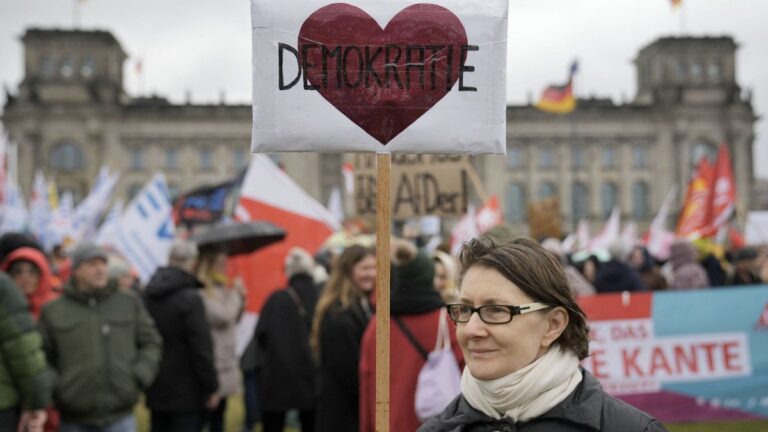Improving health care emerged as a top priority in the majority of EU countries surveyed (8 out of 15). Fighting poverty is also considered a major concern in many countries, topping the list in 4 out of 15 countries surveyed.
advertisement
A new global survey finds deepening democratic dissatisfaction in parts of Europe where governments are failing to meet people’s democratic expectations.
The Democracy Perceptions Index (DPI) is the world’s largest survey measuring the temperature of democracy, and was conducted between February and April this year, surveying around 63,000 people in 53 countries, including 15 European Union (EU) member states.
The vast majority of EU citizens (57%) consider their country to be a democracy, but in three member states – France, Greece and Hungary – majorities no longer consider it a liberal democracy.
Only 31% of Hungarians consider their country a democracy. In recent years, Hungary has been at odds with the EU over what it sees as a backslide in democracy and erosion of the rule of law, including anti-LGBT laws, suppression of independent media, widespread cronyism and political interference in the judiciary.
Discontent is also growing among Greek citizens, with only 43% considering their country to be democratic.
Greece, the birthplace of democracy, has come under intense scrutiny recently over its pushback of illegal migrants in the Mediterranean, violations of press freedom and allegations of a wide-ranging spyware investigation implicating journalists and opponents.
Earlier this year, the European Parliament adopted its first-ever resolution on the rule of law in Greece, condemning the country’s continuing decline and calling for a review of EU funding.
In France, almost half of respondents (46%) consider their country to be democratic. Economic turmoil, anger over President Emmanuel Macron’s pension reforms and growing distrust of the ruling class have caused perceptions of the country’s democracy to plummet.
In other European countries, such as Germany, there is a widening gap between what people think about the importance of democracy and how democratic they consider their country to be. This is also known as the perceived democratic deficit (PDD).
The deficit is a staggering 51% in Greece and 50% in Hungary, while in Germany it will increase by a massive 9% from 2023 onwards, now standing at 36%.
The impression that governments often act in the interests of minorities rather than the public interest has also increased on average across Europe since 2020, with a sharp increase in Germany from 34% in 2020 to 54% in 2024.
The eye-catching 20 percentage point jump reflects growing dissatisfaction with the three-party coalition government of Chancellor Olaf Scholz of the Socialist Party, the Greens and the Liberals, which took office in 2021. The coalition partners are at odds over a range of policy issues, from the budget to child benefits and economic policy, which has led to growing frustration and a decline in support for the Social Democrats (SPD).
Migration is a growing concern
The Democracy Perceptions Index (DPI) also provides insight into what citizens want their elected government to focus on.
Improving health care emerged as a top priority in the majority of EU countries surveyed (8 out of 15).
Fighting poverty is also seen as a major concern in many countries, ranking first in four of the 15 Member States surveyed.
The share of people who say “reducing immigration” should be their government’s top priority has also risen sharply over the past two years, especially in Austria, Germany, Ireland and France, where immigration has risen high up respondents’ priority lists in recent years.
Reducing immigration should be in their governments’ top three priorities, according to 44% of Germans, 40% of Austrians, 37% of French and 31% of Irish respondents.
Germany leads the world in having the highest proportion of people who want their government to focus on reducing immigration (44%), ranking it above all other priorities. Meanwhile, climate change is falling further down the list of priorities among Germans, with only 24% considering it a top three priority.
advertisement
Support for minority parties with hard-line immigration policies is gradually rising ahead of crucial European Parliament elections in June, with populist parties with strong anti-immigration policies expected to win in at least seven EU member states and come second or third in a further nine.
Recent research suggests that friction between two groups of voters – those primarily concerned about climate change and those primarily concerned about immigration – could determine the outcome of June’s European Parliament elections.
Global trust in the EU stagnates
There is still a genuinely positive perception of the EU in every country surveyed around the world, with the exception of Russia, but as with the US and the UN, its positive image has stagnated somewhat around the world.
The United States is also facing something of a perception crisis, including among the EU countries.
Opinions of the US are now net negative in Austria (-22%), Ireland (-5%), Germany (-4%), Belgium (-4%) and Greece (-4%).
advertisement
Despite the ongoing invasion of Ukraine, perceptions of Russia continue to soar on average across the globe from 2022 onwards.

